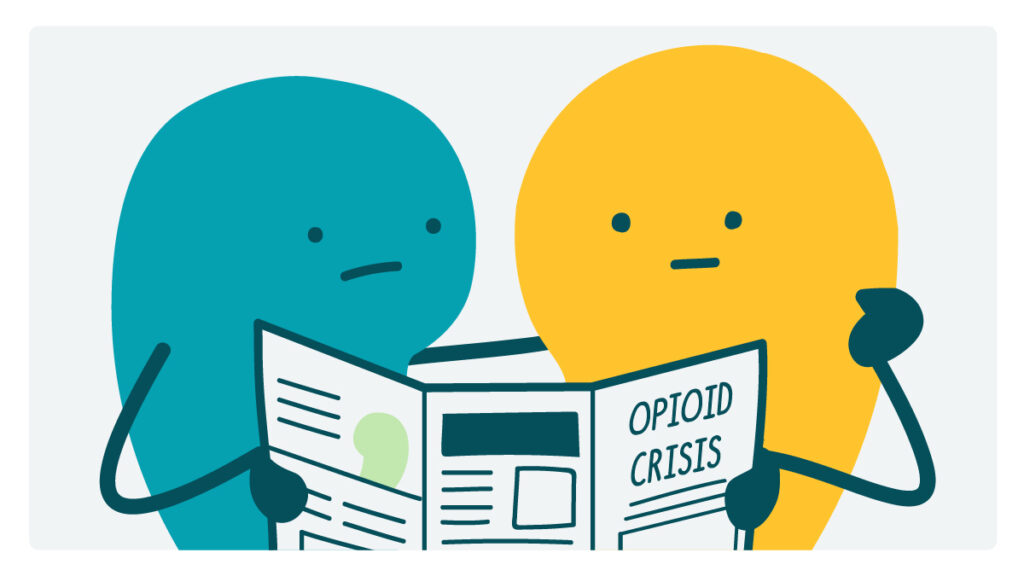
As public health crises go, few have been as devastating as the opioid epidemic. Between 1999 and 2022, opioid overdoses claimed nearly 727,000 lives in the United States alone. Now, the Food and Drug Administration (FDA) is weighing approval of a new medicine that promises to be a non-addictive alternative to opioids for treating pain. We’ll be following these developments closely — but in the meantime, we’re thinking about how we as health communicators can approach the extremely important, and extremely sensitive, topic of opioid use disorder (a question we first tried to answer in 2016).
Here’s our thoughts:
Include people with lived experience.
At this point, this almost goes without saying, dear reader — after all, nary a post gets published on here without mention of how important it is to involve your audience members in developing your materials. The more sensitive and complex the health topic, the more important it is to make sure the language you use accurately reflects the experience of people who’ve been there. That means engaging people with opioid use disorder, people in recovery, their loved ones and family members, or health care providers and allied professionals, depending on your communication goals.
Reframe addiction as a medical problem.
All too often, addiction is still viewed as a moral failure instead of what it is: a medical problem that can be treated, just like any other disease. Health comm folks like us can support this mental shift by communicating about addiction and opioid use the same way we would talk about diseases like cancer or diabetes — with a focus on empathy and inclusive, non-stigmatizing language. Another strategy is to clearly explain what happens in the body when people become physically dependent on opioids or other drugs (for example, by sharing this video from the National Institute on Drug Abuse).
Explain harm reduction (then, explain it again).
For many folks, harm reduction — taking steps to make drug use safer — is one of the trickiest concepts to wrap their head around. It’s easy to see why. At a cursory glance, harm reduction strategies like needle exchanges or the Never Use Alone hotline may seem to “enable” people with opioid use disorder rather than encourage them to stop using. We could write a whole post about this topic (and we have!), but here’s the gist: The most important goal is to keep people alive. Recovering from opioid use disorder is tough, and it often takes people years and several attempts to stop using — but recovery is possible. Harm reduction is simply a way to keep people alive and as healthy as possible while they’re on their journey.
Highlight systemic reasons for the crisis.
Acknowledging the deeply rooted systemic reasons for the opioid epidemic in our country may not solve the crisis. But it may help reduce the social stigma so many people who misuse opioids face and help shift perception away from individual blame and toward systemic responsibility. We know now that for years, opioids were heavily marketed and promoted to doctors as safe — and that for years, they were over-prescribed, with far too little regulatory oversight. We also know there’s a myriad of systemic factors that contribute to the opioid crisis, like economic hardship, unequal access to health care, and the aftermath of the COVID-19 pandemic.
Want more tips on communicating about opioids and overdose prevention? Check out this helpful messaging guide from Berkeley Media Studies Group.
Bottom line: People with opioid use disorder — and their loved ones — deserve clear, empathetic, and non-stigmatizing health information. As health communicators, we can do our part to make sure they get just that.
Copy/paste to share on social (and tag us!): The opioid crisis remains one of the most important public health topics of our time. CommunicateHealth shares thoughts on how #HealthComm professionals can talk about it: https://communicatehealth.com/wehearthealthliteracy/communicating-about-opioids-lessons-from-the-past-decade/ #HealthCommunication #HealthLiteracy #HealthCommunication #HealthLiteracy
Browse recent posts